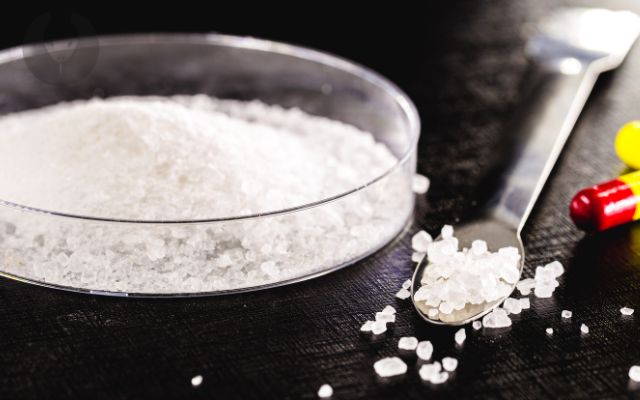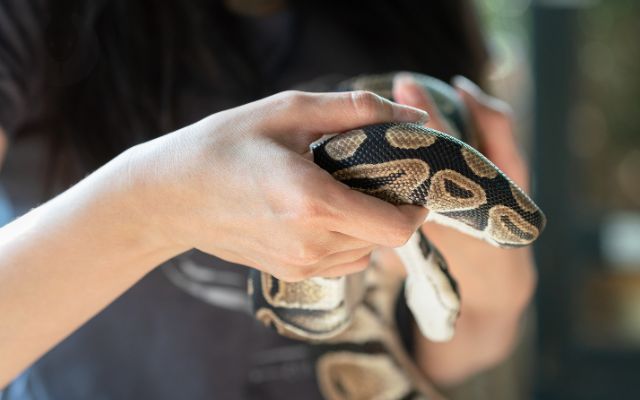The Dangers of Calcium Cyanide for Snake Owners – As snake owners, we strive to create a safe and nurturing environment for our beloved serpents. However, amidst our dedication, it’s crucial to be aware of potential hazards that could pose serious risks to both us and our scaly companions. One such danger that demands our attention is calcium cyanide. This often-overlooked substance carries with it a host of dangers and can have devastating consequences if mishandled.
In this enlightening exploration, we will uncover the hidden perils of calcium cyanide for snake owners, arming ourselves with knowledge and understanding to protect the well-being of our cherished reptilian friends. Join us as we delve into the depths of this hazardous compound, learning about its properties, the associated risks, and the vital precautions that every snake owner should take. Get ready to unlock a wealth of insights and ensure the safety and happiness of your snakes like never before!
What is calcium cyanide?

Calcium cyanide is a chemical compound that consists of calcium, carbon, and nitrogen. It is a white, crystalline solid that is highly toxic and poses serious risks to human and animal health. This compound is primarily used in industries such as mining, pest control, and agriculture due to its ability to release hydrogen cyanide gas when exposed to moisture or acids.
Hydrogen cyanide is a potent poison that interferes with the body’s ability to utilize oxygen, leading to severe health complications and potentially fatal outcomes. Calcium cyanide is typically found in the form of pellets or powder and should be handled with extreme caution. Its toxic nature makes it important for snake owners to understand the dangers associated with this substance to ensure the safety of themselves and their pets.
Potential risks to snake owners

Snake owners need to be aware of the potential risks associated with calcium cyanide, as exposure to this toxic compound can have serious consequences for both humans and their beloved reptiles. Here are some key points to consider:
- Toxicity: Calcium cyanide is highly toxic and can cause severe harm if ingested, inhaled, or even if it comes into contact with the skin. Snake owners should avoid direct contact with this substance to prevent accidental poisoning.
- Health effects: Inhalation or ingestion of calcium cyanide or its fumes can lead to symptoms such as difficulty breathing, chest pain, dizziness, nausea, vomiting, and even loss of consciousness. These effects can be life-threatening and require immediate medical attention.
- Snake health: Snakes are also vulnerable to the toxic effects of calcium cyanide. Exposure to this compound can result in respiratory distress, neurological issues, organ damage, and even death in snakes. It is crucial to keep snakes away from any potential sources of calcium cyanide to ensure their well-being.
- Contamination risk: Calcium cyanide can contaminate surfaces, equipment, or other items in the snake owner’s environment. This increases the risk of unintentional exposure to both humans and snakes. Proper handling, storage, and disposal of calcium cyanide are essential to prevent accidents and contamination.
- Safety precautions: Snake owners should prioritize safety by using protective gear, such as gloves and masks, when handling potentially hazardous substances. It is crucial to follow all safety guidelines and instructions provided by professionals when working with chemicals like calcium cyanide.
- Professional assistance: If there is a need to use calcium cyanide for specific purposes, it is advisable to seek guidance from professionals, such as pest control experts or professionals experienced in handling hazardous substances. They can provide proper advice on handling, usage, and disposal to minimize risks.
- Alternative options: Given the potential dangers associated with calcium cyanide, snake owners are encouraged to explore safer alternatives for snake-related needs. It is essential to research and consult experts to find effective and non-toxic methods for snake care, pest control, or other relevant purposes.
Skin contact risks
When it comes to the dangers of calcium cyanide for snake owners, one significant risk that cannot be overlooked is skin contact. Direct contact with calcium cyanide can have serious consequences for your skin, and it is important to be aware of the potential risks involved.
The compound is known to be absorbed through the skin, making even brief contact a cause for concern. This toxic substance is corrosive and can lead to severe irritation and burns on the skin. The effects can range from painful redness to blistering, and in some cases, may result in long-lasting scars.
Moreover, certain individuals may be allergic or hypersensitive to calcium cyanide, making them more susceptible to adverse reactions such as itching, swelling, rashes, and hives. It is crucial to remember that skin contact can also lead to the transfer of the compound to other parts of the body, increasing the risk of exposure and potential harm.
Therefore, it is essential to take the necessary precautions, such as wearing protective gloves, long-sleeved clothing, and closed-toe shoes, to minimize the risk of skin contact.
In the event of accidental contact, immediate action should be taken by rinsing the affected area thoroughly with running water for at least 15 minutes and seeking prompt medical attention. By prioritizing safety and being vigilant about skin contact risks, snake owners can ensure their well-being while handling calcium cyanide or any other hazardous substances.
Accidental ingestion risks

When discussing the dangers of calcium cyanide for snake owners, one cannot overlook the potential risks associated with accidental ingestion. While it is essential to exercise caution and prevent any situations where ingestion may occur, accidents can happen, and understanding the potential consequences is crucial.
Calcium cyanide is an extremely toxic compound that can cause severe harm when ingested. Even a small amount can have detrimental effects on the body. Once ingested, it reacts with stomach acids to release highly poisonous hydrogen cyanide gas, which can be rapidly absorbed into the bloodstream.
The symptoms of cyanide poisoning can manifest quickly and include nausea, vomiting, dizziness, difficulty breathing, rapid heartbeat, seizures, and, in severe cases, loss of consciousness and even death. It is important to note that the effects of calcium cyanide ingestion can be life-threatening and require immediate medical attention. If accidental ingestion occurs, it is vital to contact emergency medical services without delay.
Additionally, prevention is key to avoiding such incidents. Snake owners should store calcium cyanide securely in clearly labeled containers out of reach of children and pets. By being vigilant and taking appropriate safety measures, such as using childproof caps, minimizing distractions during handling, and ensuring proper storage, the risk of accidental ingestion can be significantly reduced.
Remember, the well-being and safety of snake owners and those around them should always be the top priority.
Handling and storage precautions
Handling
When it comes to handling and storing calcium cyanide, taking necessary precautions is of utmost importance to ensure the safety of snake owners. Due to its highly toxic nature, proper handling procedures are crucial to minimize the risk of exposure. When handling calcium cyanide, it is essential to wear appropriate personal protective equipment (PPE), including gloves, goggles, and a lab coat, to prevent direct contact with the skin, eyes, and clothing. Care should be taken to avoid any spills or splashes, as even a small amount of the compound can pose a significant threat. Handling should be conducted in a well-ventilated area or under a fume hood to minimize inhalation risks.
Storage precautions
In terms of storage, calcium cyanide should be kept in a secure location that is inaccessible to unauthorized individuals, particularly children and pets. It should be stored in tightly sealed, labeled containers that are resistant to corrosion and damage. Ideally, the storage area should be cool, dry, and well-ventilated to prevent the compound from deteriorating or releasing toxic gases. It is crucial to store calcium cyanide separately from other chemicals to avoid any cross-contamination. In addition, it is advisable to keep a record of the amount of calcium cyanide in storage and regularly check for any signs of deterioration or leaks.
Proper disposal of calcium cyanide is equally important. It should never be poured down the drain or disposed of with regular household waste. Instead, it should be handled as hazardous waste and disposed of following local regulations and guidelines. Contacting local authorities or waste management facilities can provide guidance on the appropriate disposal methods.
- By adhering to these handling and storage precautions, snake owners can minimize the risks associated with calcium cyanide and ensure the safety of themselves, their loved ones, and the environment. Remember, safety should always be a top priority when working with hazardous substances.
Alternatives to calcium cyanide
Fortunately, there are safer alternatives available for snake owners that can effectively serve their needs without the associated risks of calcium cyanide. These alternatives offer a more responsible approach to snake handling and care. Here are some noteworthy options:
- Natural Repellents: Consider utilizing natural repellents, such as essential oils derived from plants like cedar, cinnamon, or clove. These oils can be diluted and applied to specific areas to deter snakes without posing a risk to their health or the environment.
- Physical Barriers: Implement physical barriers around snake-prone areas. This can include installing snake-proof fences or using fine-mesh screens to seal off potential entry points like gaps in walls, windows, or doors. By blocking access, you can prevent snakes from entering your property altogether.
- Habitat Modification: Make your surroundings less inviting for snakes by removing potential hiding spots, such as piles of debris, tall grass, or overgrown vegetation. Regularly trim grass and bushes, keep outdoor areas clean, and store firewood or other materials away from your house.
- Professional Assistance: If you’re dealing with a persistent snake problem or have concerns about venomous species, it’s advisable to seek help from professional wildlife or pest control services. These experts have the knowledge and tools to address snake issues safely and effectively.
- Education and Awareness: Learning about snakes, their behaviors, and habitat preferences can go a long way in preventing conflicts and ensuring your safety. Understanding how to coexist with snakes and respecting their natural role in the ecosystem can help foster a peaceful coexistence.
Conclusion
In conclusion, the dangers of calcium cyanide for snake owners cannot be overlooked. Its toxic nature and potential risks to human health, snake well-being, and the environment make it a hazardous choice. Skin contact, accidental ingestion, and improper handling or storage can have severe consequences. However, as responsible snake owners, we have the power to choose safer alternatives and take precautionary measures to ensure the well-being of both ourselves and our snakes.
By educating ourselves about the potential risks associated with calcium cyanide, we can make informed decisions and seek out safer options. It is essential to prioritize the health and safety of our beloved reptile companions while also being mindful of the environment in which they thrive.
To further expand your knowledge on snake care, safety, and alternative methods, I encourage you to visit the VenomousSnakes blog. There, you’ll find a wealth of information, practical tips, and expert advice to guide you in creating a secure and responsible environment for you and your snakes. Remember, by choosing safer alternatives and staying informed, we can be responsible and conscientious snake owners.






